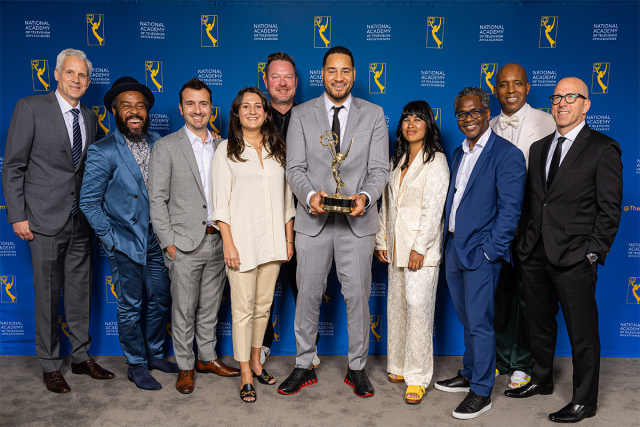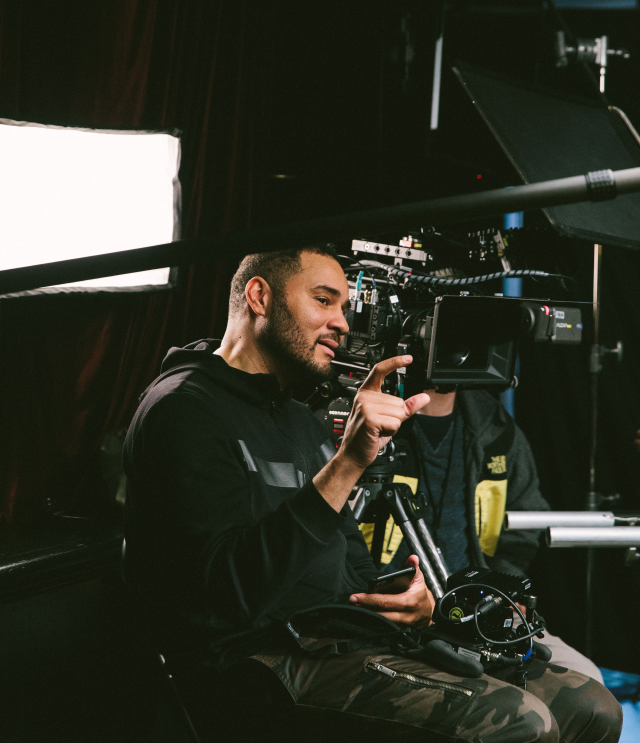Communication Graduate Pursues Social Justice as Documentary Filmmaker for Major Networks

Erik Parker '01, center, holding the Emmy, and his team received a Sports Emmy Award for Outstanding Documentary Series for the six-part Netflix documentary, Race: Bubba Wallace.
As a film director and producer, Erik Parker ’01 aims to open people’s minds through documentaries and TV shows that emphasize social justice.
In May, Parker and his team received a Sports Emmy Award for Outstanding Documentary Series for the six-part Netflix documentary, Race: Bubba Wallace. The 2022 miniseries, for which Parker was the director and executive producer, looked at the racial divide within NASCAR by following Wallace, a Black driver who became an agent of change.

It was Parker’s second Emmy nomination. His film, L.A. Burning: The Riots 25 Years Later, which looked back at the 1992 Rodney King riots in Los Angeles, was nominated as best documentary in 2017.
Social justice was also at the heart of Smoke: Marijuana + Black America, his 2020 documentary exploring the complicated effects of marijuana in the Black community.
“It's rewarding because there are so many stories I get to tell that make a cultural impact,” said Parker, who lives in Bloomfield, New Jersey. “They’re stories that can impact people's lives and the way they see the world.”
After graduating from Kean in 2001 with a B.A. in communication, Parker was a music journalist until he collaborated with friends on a documentary about his favorite album. Nas: Time is Illmatic looked at the artist’s journey toward making the album — and at societal inequities.
“It took 10 years for us to debut that documentary at the Tribeca Film Festival in 2014,’” Parker said. “We made the film independently and then licensed it to Showtime. It was a passion project that turned into a new career for me.”
Jack Sargent, Ph.D., chair of Kean’s Department of Communication, Media and Journalism (CMJ), is impressed with Parker’s success.
“Erik Parker’s achievements as a filmmaker exemplify the power of a Kean communication degree, and his focus on social justice issues and stories reflects a principle that’s central to our philosophy here at Kean University,” Sargent said. “With a faculty composed of established journalists, writers, scholars, filmmakers and public relations professionals, CMJ prepares our graduates to change the world by crafting and delivering messages that inform and move people.”
Parker’s worldview was shaped, in part, by his participation in Kean clubs and as student government president, which taught him to lead diverse teams. In the classroom, he enjoyed learning about communication theory and how to make presentations, as well as about TV and radio production. He built a network by landing internships at The Source magazine and Jive Records and completing a summer fellowship at BET through the Washington Center for Internships and Academic Seminars, a nonprofit that works to provide internships to students nationwide.
Parker grew up in Mount Holly and was a disinterested student, by his own account. He attended Kean through the Equal Employment Opportunity program, which brought at-risk students together for extra guidance.
“That opportunity paid off, for me and I hope for society, because it helped me realize my potential,” he said.
Later, Parker earned a master’s degree in journalism, concentrated in politics, from Columbia University in 2010.
Eddie Ojeda, a cameraman with WCBS in New York who hosted a hip-hop show with Parker on Kean’s radio station in 1994, has enjoyed watching his friend’s career flourish.
“He was determined and has always been a big-picture thinker, even to this very day,” said Ojeda, who earned a B.A. in communication, with an emphasis in broadcasting, from Kean in 1998. “I'm honored to consider him both a dear friend and a valued professional colleague."
Parker’s only regret about his years at Kean is that he never made a movie on campus.
“The people, the equipment and the help were there,” he said, “because at Kean you have access to so much at your fingertips.”